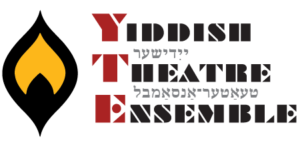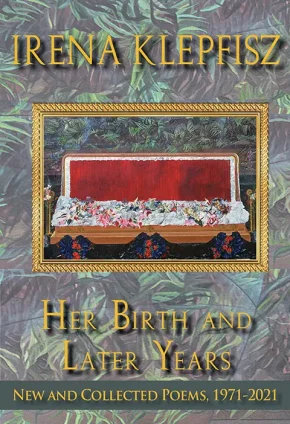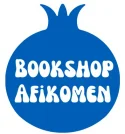Playbill
Yiddish Theatre Ensemble Presents a New Works Lab Production
Between Worlds
Based on the life and poetry of Irena Klepfisz
Conceived and written by Naomi Newman
Directed and Choreographed by Bruce Bierman
August 16-20, 2023 at Live Oak Theatre, Berkeley
Playwright's Notes from Naomi Newman
May everyone who sees Between Worlds be as moved and healed by Irena Klepfisz’s life and poetry as I am. I’m awed by her journey from childhood trauma in Poland during the Second World War and how that informed her life as an artist, activist, and loving partner in her adult life. What you will hear tonight are her words, a braiding together of many of her poems. Only a few words are mine for connective purposes.
I was introduced to her work when A Traveling Jewish Theatre included two of her bi-lingual poems in its poetry play, Diamonds in the Dark. They were the most impactful pieces in the play. It was then I knew I wanted to go deeper into Irena’s work. It is an honor to portray this courageous, dimensional woman and to introduce her to you.
Director’s Notes from Bruce Bierman
When A Traveling Jewish Theater founder, Naomi Newman, first presented the idea of collaborating on a new project with YTE, I must confess—co-artistic director Laura Sheppard and I had set our hearts on a rollicking comedy or musical. Anything uplifting. The world was still in the debilitating isolation of Covid and many of us still couldn’t find the lamentation needed to grieve the reign of hate mongering and anti-immigrant sentiments that reared its familiar ugly head here in our country. We thought audiences might need some kind of escape from our relentless collective tzuris—troubles. Being the soulful theater shaman she is, Ms Newman believed otherwise. She presented YTE with Between Worlds—a play based on the words and life of poet Irene Klepfisz. In the play, Irena, the ‘keeper of accounts’, takes a courageous decision that most of us would prefer to avoid. She chooses to look closely at her own shadowed past. As a side note, the ancient Greek word for theater, ‘theatron’ literally means ‘a place of seeing’. In this theater of poetry and seeing, Irena looks fearlessly at her early years as a child refugee out of the ashes of the Warsaw Ghetto to becoming a ‘stranger in a strange land’. She turns her eye on her own struggle between the necessity of work and the yearning to have the luxurious time needed to loaf and daydream as a poet. She looks at the everyday loving acts of being in a long relationship and the painful price of loving someone–the possibility of loosing them. In doing so, she organizes through the revolutionary act of writing, a way to befriend her shadows rather than become undone by them. Resigned to her nature as an ‘outsider’, Irena looks, observes, interprets and participates in the writing of her own story in her own hard won unique voice—always a cause for celebration—giving us, her audience, permission to do the same.
Irena, the poet — Naomi Newman
Young Irena & Ensemble — Aviya Hernstadt
Rose Klepfisz, Judy & Ensemble — Diana Bukowska
Michal Klepfisz & Ensemble — Ariel Luckey
Musicians
Barbara Borden (Percussion) — Susanne DiVincenzo (Cello and Bass)
Settings
Between Worlds Production Team
Yiddish Theatre Ensemble Co-Artistic Directors
Laura Sheppard, Producer and Bruce Bierman, Director
Assistant Director Karen Sellinger
Lighting Designer Kevin Myrick
Stage Managers Priyana Atwal, Romeo Channer
Costume Designer Kayleigh Stump
Director of Photography, Film Editor Jeremy Knight
Camera, Sound & Film Editing Jeremy Knight, Mark Faulkner
Dramaturg Zack Rogow
Community Outreach Consultant Michaela Aizer
Production Consultant/Fundraising Esther Shaw
Fundraising Denah Bookstein
Media Consultant Nadav Hochman
Grantwriter/ Media Consultant Dorrit Geshuri
Development Consultant Carolann Biederman
Photographer Vaschelle Andre
Publicist Lisa Geduldig
Her Birth and Later Years: New and Collected Poems, 1971-2021 (Wesleyan University Press) by Irena Klepfisz is available at Afikomen
Thanks to composer Amanda (Miryem-Khaye) Seigel for the melody of Di Bahlatens Libe (Hidden Love).
This production is made possible in part by a CA$H Grant from Theatre Bay Area and the generous support of a grant from the Jack and Diane Stuppin Fund of the Community Foundation Sonoma County.
A big “shout out” to our GoFundMe supporters!
Special thanks to our Community Cosponsors
Afikomen, JCC of the East Bay, Jewish Community Library, Kung Pao Kosher Comedy, Mechanics’ Institute, Shar’ar Zahav, TheatreFirst, The Magnes Collection of Jewish Art and Life, UC Berkeley-Center for Jewish Studies, Wesleyan University Press
Our Appreciation to our Theatre Colleagues, Friends & Volunteers
Victoria Erville, TheatreFirst Collective Co-Director/ Managing Director, Lindsey Abbott, Audience Development Manager, Berkeley Rep, Judith Kunofsky, Executive Director, KlezCalifornia, Lauren McQuade, City Box Office, Professor Dov Hassan, Chabot College Theatre Department, Anne Weinberger, Garden Design, Gilberto Melendez, Prester Wilson, Natalie Fay, and our Volunteers!
Songs that are included in Between Worlds
Compiled by Susanne DiVincenzo; August 2, 2023
Songs are listed in the order of their appearance in the show.
Yiddish and Jewish Folk/Traditional Songs
Di bundishe shvue, The Vow or Oath, The Jewish Labor Anthem; Sh. Ansky; 1902
Unter dyne vayse shteren, Under the Starry (White) Sky; Avraham Sutskover/Avraham Brodna; 1943
Zog nit keyn mol, (Never Say) The Partisan Song; Dmitri Pokras/Hirsh Glick; 1943
Mayn rue platz, My Resting Place; Morris Rosenfeld; c1920
Oyfn veg shteyt a boym, Along the Road There Stands a Tree; Yitzik Manger/Schmuel Fischer; c1921
Friling, Spring; Shmerke Kazerginski; 1943
Shabbat Blessing; traditional
Schtiller, schtiller, Hush, Hush; Alexander Volkovitzky/Schmerke Kazerginski; 1943
Papirossen, Cigarettes; Herman Yablokoff; 1922
Donna Donna; Shalom Secunda/Aaron Zeitlin; 1940
Arum dem fayer, Around the Campfire; Tova Ben-Tzvi; c1935
Popular Songs from the Twentieth Century
For All We Know; J. Fred Coots/Sam M. Lewis; 1934
America the Beautiful; Samuel A. Ward/Katharine Lee Bates; 1910
How About You?; Ralph Freed, Burton Lane; 1941



